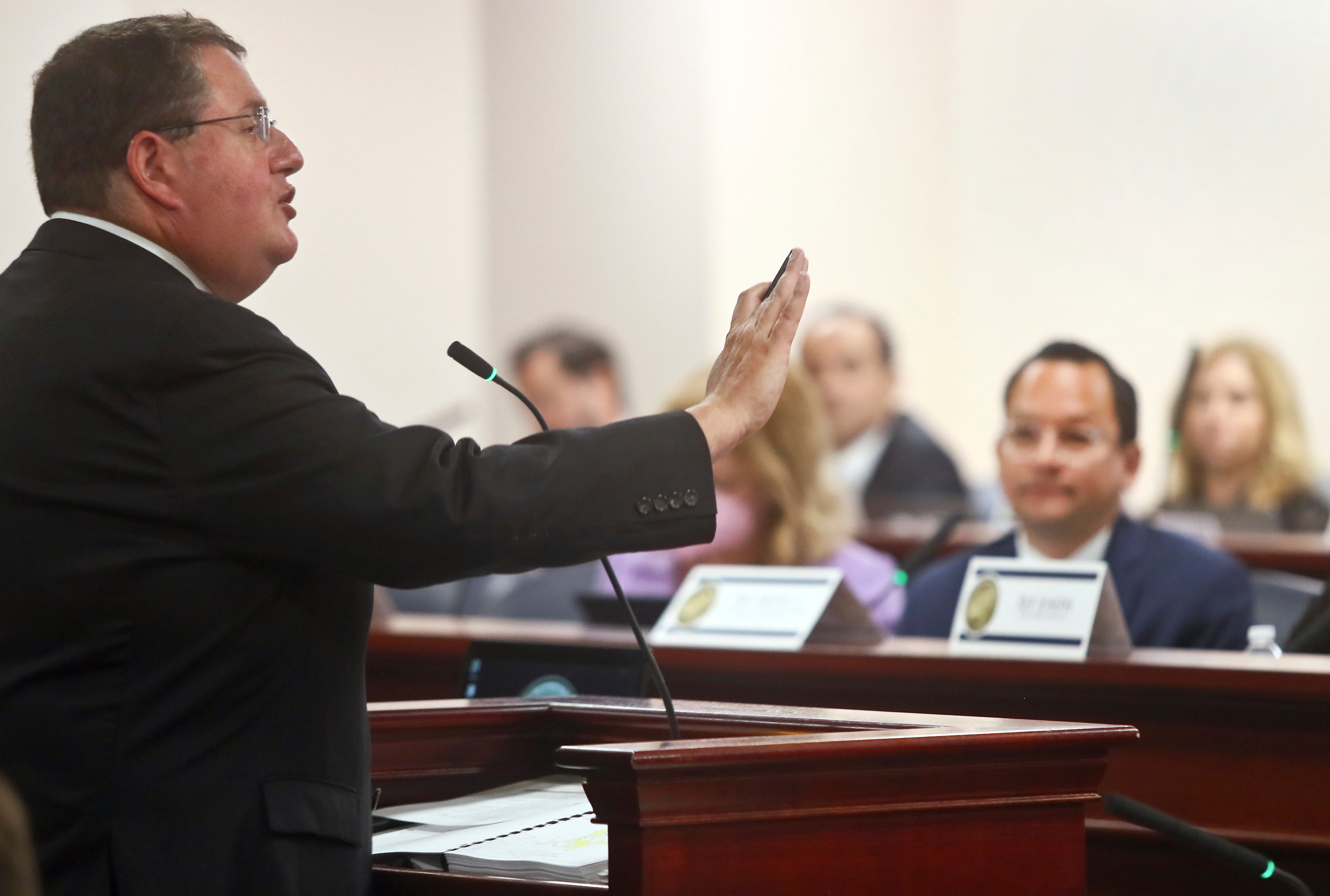How Florida residents could end up paying for the GOP’s war with Disney over ‘Don’t Say Gay’
Dissolving the decades-old governing structure for Disney’s sprawling properties could come at a cost for taxpayers in neighbouring counties, Florida officials warn

Efforts by Florida Republicans and Governor Ron DeSantis to revoke Disney World’s decades-old governing agreement could force local governments to raise taxes for thousands of residents in neighbouring counties who are forced to shoulder hundreds of millions of dollars in Disney’s debt obligations, according to local officials.
The state’s Republican-dominated state legislature is likely to quickly approve a measure during a special legislative session that would eliminate the governing structure for the company’s sprawling theme park properties in 2023. It passed the state Senate on 20 April.
Florida officials warn that dissolving the Reedy Creek Development District – which the Walt Disney Company negotiated with Florida legislators in the 1960s to effectively create its own taxation and government district for its Orlando-area parks and resorts – could burden Florida residents with higher property taxes and end employment for hundreds of municipal workers, all in the name of retribution for the company’s opposition to what critics call the “Don’t Say Gay” law.
“Why are we putting our knee on the neck of the mouse?” said state Senator Janet Cruz. “It’s nothing short of extortion. It’s nothing short of bullying.”
Details of the dissolve are still murky, though legal analysts and legislators reviewing the bill contend that voters living within the district will likely end up having final say on whether to move forward.
Republican state Senator Jennifer Bradley, who sponsored the legislation, said the bill kicks off a process for legislators to “exercise those very appropriate oversight functions”, though the details of Reedy Creek’s future are unclear.
“We have a year,” she said on Wednesday. “We have local governments who will be involved, and I assure you will have a legislature that is involved to make sure the parade of horribles that has been described does not happen.”
The Reedy Creek Improvement District, implemented in 1967, operates as the governing structure for Disney World properties in Bay Lake and Lake Buena Vista, spanning 39 square miles and land across Orange and Osceola counties.
Within the governing body, Disney effectively can control its own land use and zoning rules and operate its own public services, including water, sanitation, emergency services and infrastructure maintenance.
With Disney as the primary landowner for the district, the company is largely responsible for all costs of those municipal services that otherwise would fall under the jurisdiction of county and local governments, including the taxpayers who live within them, essentially easing the burden from neighbouring counties and placing it on one of the largest companies in the world.
In effect, Disney taxes itself to foot the district’s bill for all of its municipal needs. Without that arrangement, another government would have to provide them. In exchange, those governments would collect a huge sum from Disney’s tax revenue that the company currently pays itself.
That also means taxpayers could be on the hook for infrastructure projects like road construction that Disney currently pays for.
The district collects roughly $105m annual in general revenue, according to Scott Randolph, the tax collector for Orange County.
“If Reedy Creek goes away, the $105m it collects to operate services goes away,” according to Mr Randolph. “That doesn’t just transfer to Orange County because it’s an independent taxing district. However, Orange County then inherits all debt and obligations with no extra funds.”
To handle that debt, households in Orange and Osceola counties could face higher property tax bills to the tune of $2,200, according to Democratic state Senator Gary Farmer.
The senator sought to amend the measure to allow time to study its impact, fearing that Florida’s taxpayers would end up inheriting Disney’s debt obligations.
The district carries a long-term bonded debt of more than $977m, according to its latest financial report.
“This is not conjecture. This is Florida law that says those 1.7 million people are going to have to pick up this bill,” Senator Farmer said on Tuesday. “This is ‘shoot first and ask questions later.’”
Democratic state Senator Victor Torres also pointed to the lack of clarity about the fates of roughly 400 firefighters and emergency medical personnel, as well as other district employees within Reedy Creek, if the district disappears.
“No one discussed these changes and the financial responsibilities the counties would have to assume,” he said on Wednesday.

For years, Florida legislators and the governor’s office have enjoyed a close relationship with Disney, the state’s largest private employer, with roughly 80,000 theme park workers alone.
Disney also is a political heavyweight, dispatching several lobbyists to Tallahassee for legislative sessions and spending tens of thousands of dollars through its many entities to Democratic and Republican legislators each election cycle to promote its business.
Campaign finance records reviewed by The Independent found that Disney entities contributed thousands of dollars to the re-election campaigns of the primary sponsors of the Parental Rights in Education Act, as well as at least $50,000 to the governor’s 2022 re-election campaign, despite the company’s history of LGBT+ advocacy.
Following weeks of pressure among LGBT+ advocates and Disney employees to publicly lobby against the bill, CEO Bob Chapek announced that the company would oppose the bill and suspend its political donations in the state.
The measure, signed into law on 28 March, prohibits instruction of “sexual orientation or gender identity” from kindergarten through the third grade and any such discussion “that is not age-appropriate or developmentally appropriate for students” in other grades.
The broadly written law – the subject of a federal lawsuit claiming violations of federal antidiscrimination statutes – could freeze classroom speech involving LGBT+ people and issues, from civil rights history lessons to discussion of LGBT+ students, school staff and their families, according to opponents.
Governor DeSantis and members of his administration then lashed out at the company, igniting a feud that escalated to Republican threats to punish its operations in the state.
In a statement, Disney said the bill “should never have been passed and should never have been signed into law”.
“Our goal as a company is for this law to be repealed by the legislature or struck down by the courts, and we remain committed to supporting the national and state organisations working to achieve that,” the company said on 28 March, when the governor signed the bill into law.
Two days later, Florida state Rep Spencer Roach said a group of state legislators met at least twice to discuss potentially changing municipal government agreements affecting Disney in retaliation for what he called the company’s “woke ideology.”
This week, Governor DeSantis expanded the scope of a special legislative session on the state’s redistricting plans to also consider the “termination of all special districts that were enacted in Florida prior to 1968.”
On 19 April, Republican state Rep Randy Fine introduced House Bill 3C, the “Independent Special Districts” bill. A companion measure, Senate Bill 4C, was introduced in the state Senate.
“Disney is a guest in Florida,” Rep Fine said on Twitter. “Today, we remind them.”

The governor and his administration have insisted the deal intends to block “special privileges” for big business in the state, though his latest campaign fundraising message promoting Reedy Creek’s demise points to Disney’s “woke” opposition to the so-called “Don’t Say Gay” bill.
“Disney thought they ruled Florida,” an email from his campaign on 19 April said. “They even tried to attack me to advance their woke agenda. Now, parents see Disney for what it is. And now is the time to put the power back in the hands of Floridians and out of the pockets of woke executives.”
“This is kind of like parents putting their kids on restrictions – ‘clean up your act, apologise, say you’re sorry, and agree to change your behaviour, and maybe you’ll get your phone back,’” Democratic state Senator Loranne Ausley said on Wednesday.
“We’re adding insult to injury by voting on something today that was proposed yesterday, going after a private business that literally made our state what it is, all because they’ve taken a position that the governor disagrees with,” she said.
Democratic state Rep Carlos Smith, the first openly LGBT+ person to serve in the state’s legislature, said Republican state legislators “pulled out the rug from underneath all of these workers and businesses, and really pulled the rug out from central Florida’s economy, all because one business had the gall to stand up for the LGBTQ community.”
“That’s what this is about,” he said.
Orange County Comptroller Phil Diamond told Orlando’s News 6 that the measure could have a “big impact on Orange County and on Orange County taxpayers”.
A statement from Orange County Mayor Jerry L Demings through a government spokesperson to The Independent says the county will await final legislative actions before offering further comments.
A spokesperson for Osceola County to The Independent also says the county is monitoring the legislation.
The Independent has requested comment from Disney and Reedy Creek board members. The district’s next board meeting is on 27 April.


Join our commenting forum
Join thought-provoking conversations, follow other Independent readers and see their replies
0Comments